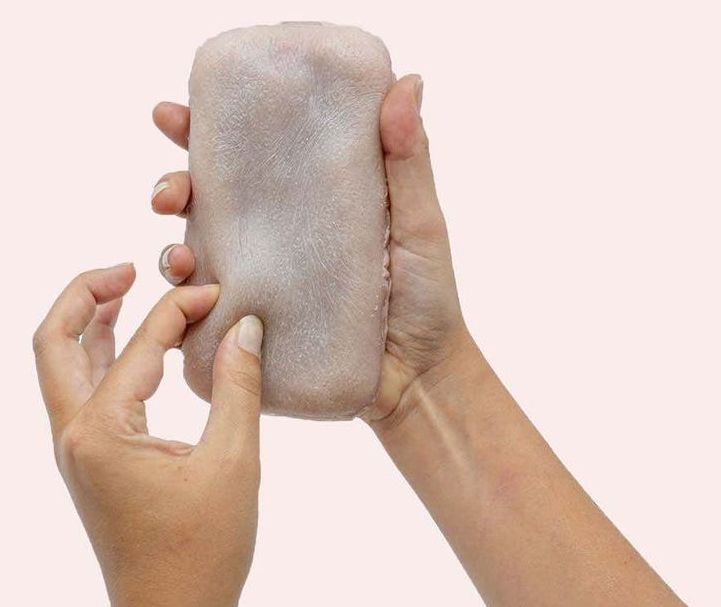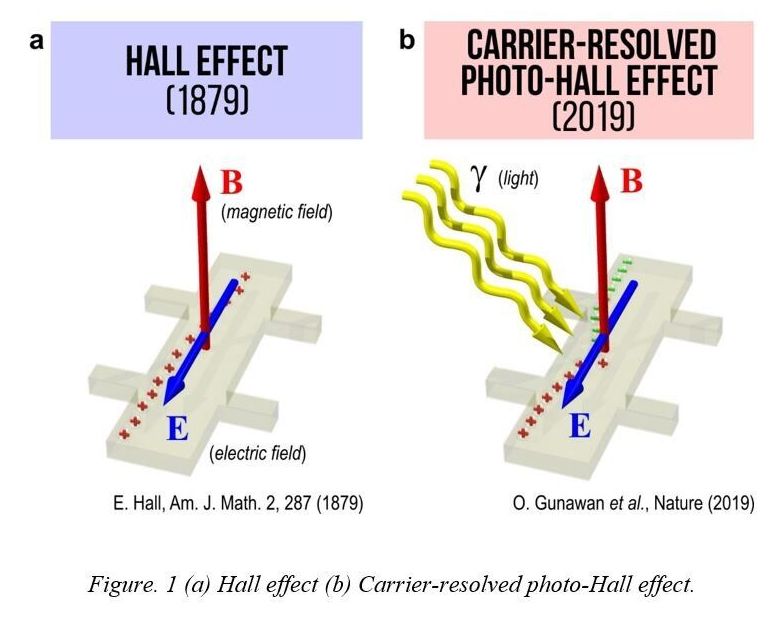A smartphone case made from artificial human-like skin responds to being pinched, tickled and stroked to add an extra layer of interactivity to the device.



Magnetic reconnection, a process in which magnetic field lines tear and come back together, releasing large amounts of kinetic energy, occurs throughout the universe. The process gives rise to auroras, solar flares and geomagnetic storms that can disrupt cell phone service and electric grids on Earth. A major challenge in the study of magnetic reconnection, however, is bridging the gap between these large-scale astrophysical scenarios and small-scale experiments that can be done in a lab.
Researchers have now overcome this barrier through a combination of clever experiments and cutting-edge simulations. In doing so, they have uncovered a previously unknown role for a universal process called the “Biermann battery effect,” which turns out to impact magnetic reconnection in unexpected ways.
The Biermann battery effect, a possible seed for the magnetic fields pervading our universe, generates an electric current that produces these fields. The surprise findings, made through computer simulations, show the effect can play a significant role in the reconnection occurring when the Earth’s magnetosphere interacts with astrophysical plasmas. The effect first generates magnetic field lines, but then reverses roles and cuts them like scissors slicing a rubber band. The sliced fields then reconnect away from the original reconnection point.

Listen to The A Level Biologist Podcasts episodes free, on demand. As we enter the golden age of life science we should not just keep getting sick and dying. Too much to ask for?Learn more about Aubrey and SRF at https://www.sens.orgFull transcript: https://thealevelbiologist.co.uk/indefinite-health-with-dr-aubrey-de-grey/The A Level Biologist Podcasts is brought to you by The A Level Biologist — Your Hub @ https://thealevelbiologist.co.ukSupport the show. The easiest way to listen to podcasts on your iPhone, iPad, Android, PC, smart speaker – and even in your car. For free. Bonus and ad-free content available with Stitcher Premium.

Are you ready for the future? A Transhumanist future? One where everyone around you—friends, family, and neighbors—has dipped into the transhumanist punch bowl. A future of contact lenses that see in the dark, endoskeleton attached artificial limbs that lift a half-ton, and brain chip implants that read your thoughts and instantly communicate them to others. Sound crazy? Indeed, it does. Nevertheless, it’s coming soon. Very soon. In fact, much of the technology already exists. Some of it’s being sold commercially at your local superstore or being tested in laboratories right now around the world.
We’ve all heard about driverless test cars on the roads and how doctors in France are replacing people’s hearts with permanent robotic ones, but did you know there’s already a multi-billion dollar market for brain wave reading headsets? Using electroencephalography (EEG) sensors that pick up and monitor brain activity, NeuroSky’s MindWave can attach to Google Glass and allow you to take a picture and post it to Facebook and Twitter just by thinking about it. Other headsets allow you to play video games on your iPhone just with your thoughts too. In fact, well over a year ago now, the first mind-to-mind communication took place. A researcher in India projected a thought to a colleague in France, and using their headsets, they understood each other. Telepathy went from science fiction to reality.
The history of transhumanism—the burgeoning field of science and radical tech used to describe robotic implants, prosthetics, and cyborg-like enhancements in the human being and its experience—has come a long way since scientists began throwing around the term a half century ago. What a difference a generation or two makes. Today a thriving pro-cyborg medical industry is setting the stage for trillion-dollar markets that will remake the human experience. Five million people in America suffer from Alzheimer’s, but a new surgery that involves installing brain implants is showing promise in restoring people’s memory and improving lives. The use of medical and microchip implants, whether in the brain or not, are expected to surge in the coming years. Some experts surmise as many as half of Americans will have implants by 2020. I already have one in my hand. It’s truly a new age for humans.

The research scientists’ warnings come amid rising concern about the power of the big tech companies. Most of the focus has been on the current generation of technology — search, online advertising, social media and e-commerce. But the scientists are worried about a barrier to exploring the technological future, when that requires staggering amounts of computing.
Each big step of progress in computing — from mainframe to personal computer to internet to smartphone — has opened opportunities for more people to invent on the digital frontier.
But there is growing concern that trend is being reversed at tech’s new leading edge, artificial intelligence.
Computer scientists say A.I. research is becoming increasingly expensive, requiring complex calculations done by giant data centers, leaving fewer people with easy access to the computing firepower necessary to develop the technology behind futuristic products like self-driving cars or digital assistants that can see, talk and reason.
The industry science behind EMF radiation is more corrupt than that of climate science, and has been so since the beginning. With the imminent rollout of 5G, no scientific studies have been done on exposure to humans at any distance. ⁃ TN Editor.
Neurosurgeon and researcher Dr. Leif Salford has conducted many studies on radio frequency radiation and its effects on the brain. Dr. Salford called the potential implications of some of his research “terrifying.” Some of the most concerning conclusions result from the fact that the weakest exposure levels to wireless radiation caused the greatest effect in causing the blood brain barrier to leak.
Since he began his line of research in 1988, Dr. Leif Salford and his colleagues at Lund University Hospital in Sweden has exposed over 1,600 experimental animals to low-level radiation. Their results were consistent and worrisome: radiation, including that from cell phones, caused the blood-brain barrier–the brain’s first line of defense against infections and toxic chemicals–to leak.

Smile! You’re on camera — or you were at some point in the past few years — and now your face is public domain.
Facial recognition technology is everywhere, and only becoming more pervasive. It’s marketed as a security feature by companies like Apple and Google to prevent strangers from unlocking your iPhone or front door.
It’s also used by government agencies like police departments. More than half of adult Americans’ faces are logged in police databases, according to a study by Georgetown researchers. Facial recognition technology is used by governments across the globe to identify and track dissidents, and has been deployed by police against Hong Kong protesters.

Something called the fast Fourier transform is running on your cell phone right now. The FFT, as it is known, is a signal-processing algorithm that you use more than you realize. It is, according to the title of one research paper, “an algorithm the whole family can use.”
Alexander Stoytchev – an associate professor of electrical and computer engineering at Iowa State University who’s also affiliated with the university’s Virtual Reality Applications Center, its Human Computer Interaction graduate program and the department of computer science – says the FFT algorithm and its inverse (known as the IFFT) are at the heart of signal processing.
And, as such, “These are algorithms that made the digital revolution possible,” he said.

Semiconductors are the basic building blocks of today’s digital, electronic age, providing us a multitude of devices that benefit our modern life, including computer, smartphones and other mobile devices. Improvements in semiconductor functionality and performance are likewise enabling next-generation applications of semiconductors for computing, sensing and energy conversion. Yet researchers have long struggled with limitations in our ability to fully understand the electronic charges inside semiconductor devices and advanced semiconductor materials, limiting our ability to drive further advances.
In a new study in the journal Nature, an IBM Research-led collaboration describes an exciting breakthrough in a 140-year-old mystery in physics—one that enables us to unlock the physical characteristics of semiconductors in much greater detail and aid in the development of new and improved semiconductor materials.
To truly understand the physics of semiconductors, we first need to know the fundamental properties of the charge carriers inside the materials, whether those particles are positive or negative, their speed under an applied electric field and how densely they are packed in the material. Physicist Edwin Hall found a way to determine those properties in 1879, when he discovered that a magnetic field will deflect the movement of electronic charges inside a conductor and that the amount of deflection can be measured as a voltage perpendicular to the flow of charge as shown in Fig. 1a. This voltage, known as the Hall voltage, unlocks essential information about the charge carriers in a semiconductor, including whether they are negative electrons or positive quasi-particles called “holes,” how fast they move in an electric field or their “mobility” (µ) and their density (n) inside the semiconductor.

The 2019 Nobel Prize in Chemistry was awarded to John B. Goodenough (The University of Texas at Austin), M. Stanley Whittingham (Binghamton University, State University of New York), and Akira Yoshino (Asahi Kasei Corporation and Meijo University) “for the development of lithium-ion batteries”. With the creation and subsequent optimization of lithium-ion batteries to make them more powerful, lighter, and more robust, the seminal work of Goodenough, Whittingham, and Yoshino has had a profound impact on our modern society. This ubiquitous technology has revolutionized our daily lives by paving the way for portable electronics and made renewable energy sources more viable. While attempts to improve the performance of batteries continue, the lithium-ion battery has remained the world’s most reliable battery system for more than 40 years. The three winners will each receive an equal share of the roughly $1 million award. At 97, Goodenough is now the oldest person ever to win the Nobel Prize.
“A long-awaited recognition for the creators of lithium-ion batteries has come true. The electrochemistry and material science communities – and the greater chemistry community as a whole – are excited to hear the news of the 2019 Nobel Prize award to John B. Goodenough, M. Stanley Whittingham, and Akira Yoshino for their pioneering contribution to lithium-ion batteries,” said ACS Energy Letters Editor-in-Chief Prashant Kamat. “As we all know, the lithium-ion battery has revolutionized our modern-day activities. From mobile phones to laptops and from electronic gadgets to electric cars, these storage batteries have become part of our everyday life. We at ACS Publications are excited to be part of this celebration.”
Whittingham laid the foundation of the lithium-ion battery while working at Exxon in the 1970s. During that time, the oil crisis in the United States was ongoing, and there was a strong drive to develop methods of energy storage and transport that did not rely on fossil fuels. Whittingham developed a 2V lithium-ion battery based on a titanium disulfide cathode and lithium metal anode. While a seminal contribution to the advancement of the lithium battery, adopting Whittingham’s system for everyday use would be limiting due to the high reactivity of lithium metal and risk of explosion.